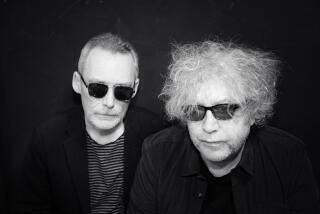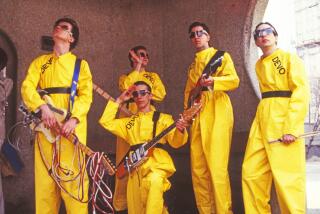Teenage Jesus and the Jerks, Ork Records CD sets are time capsules of ‘70s punk and more
- Share via
“Teenage Jesus and the Jerks: Live 1977-1979” contains 29 songs recorded in the mid-’70s. The music sounds like next week. (“Baby Doll” could easily be on the new Savages album, “Adore Life,” give or take a few choices.) These recordings were not available until now.
“Ork Records: New York, New York” is a two-CD set of 49 songs recorded in the mid-’70s. With a few exceptions, the music sounds like mid-’70s. These recordings were available for a moment, but for many of us they might not as well have been.
All of this music was mythic and real.
Once a dumb New York City kid, I can now watch much smarter kids all over the world discover this music. Several wheels of history rotate over one another at the same time. We hear now how these artists heard themselves and think about how artists were, technically, able to record their own work.
See more of Entertainment’s top stories on Facebook >>
This newly available live documentation of Teenage Jesus and the Jerks — a band that was mostly a platform for the singing and guitar playing of Lydia Lunch, as much solvent as signal — is better than any studio recordings we have of the band.
Those exist and are worth it if you want to hear the words more clearly, but the magic of this band is in the hair, the spit, the transient noises and everything else a ‘70s engineer was trained to eliminate. And did.
Just kids in NYC
When I was a teenager in New York, talk of punk’s majesty was almost as reverential as the discussion of the ‘60s. Local press like New York Rocker or, more essentially, the Village Voice, discussed the Clash and Marx in the same paragraph like it was all one big political art project. Except, hang on, you’d read a piece the same day and saw that Mark P of the British fanzine Sniffin’ Glue had already said, “Punk died the day the Clash signed with CBS.” Wait: Let’s check our copy of “Sandinista!” Yep, CBS.
This wasn’t much like political correctness — this was political fact-checking combined with the jolt of noise (they all loved that) and the confused adolescent energy that favors utopian tendencies and split-second cohort switching.
When we were back in the earlier ‘70s hearing people bang on about Beatles records, hell, your parents probably had them. (Mine did, and they didn’t even like popular music.) But reading about the conjuring power of Television (punk? Wait — rock?) or Lydia Lunch (No Wave?) or Patti Smith (was she a poet?) didn’t make it easier to find their records. Disco had a better PR campaign and a lower barrier to entry. (Note to utopians.)
Before we were old enough to get into clubs, all we had were records and radio. By the time we were old enough to get into clubs, almost three waves of bands had come and gone. We heard about punk coming to town as early as 1975. In 1980, just as I was hitting my teens, we had No Wave tearing all of that down. Um, OK.
And had any of this stuff gotten onto the radio? When we did find an album, it rarely lined up with the profile bundled into the hype. I got lucky with the Ramones’ debut, which I found when I was only 12. The store on Fulton Street that sold it is long gone, and I had no idea why they stocked one copy of it, but thank God that they did. It probably sounded muted, to a real punk fan, but it was plenty threatening and weird to a pre-teen who didn’t even know why you’d sniff glue unless you were building a model of an aircraft carrier.
Other albums, though, did not sound like the coming of a new era. Patti Smith albums sounded more or less like other ‘70s rock, and she was working with Bruce Springsteen, who was rock, right? Damn, he was on the radio. Revolutions sometimes happen so quickly that those on the outside can’t tell the defenders from the attackers. The Sex Pistols definitely had an embarrassing name, but except for the acidic warbling, the music sounded a lot like the rock ‘n’ roll we knew, beefed up. Lydia Lunch, one of the people at the center of No Wave, the blowback to the CBGB scene, described punk as “Chuck Berry on speed.”
Teenage Jesus and the Jerks was playing Max’s Kansas City as early as 1977 and sounding nothing like the music echoing between New York and London. Their music was brief and discordant and barely related to any known tuning system.
“After 90 seconds, you’re just repeating yourself,” Lunch said over the phone from New York. (She lives most of the time now in Barcelona, Spain.) These recordings are higher fidelity than you expect and as cracked as the new world was going to be. Everything we’d read about this mighty negation, this rejection of standard rock, is there in these songs.
Only four songs break the two-minute mark. It’s the shot heard around the block, rebroadcast 30 years later. Lunch on the phone is not much different than Teenage Jesus, except more polite, funnier. But just as pithy: “It’s always been me and a megaphone on stage. I’ve always been here. And I have a lot of work left to do.”
Ork Records
The Ork Records box set revives music made slightly before Teenage Jesus; some of it is contemporaneous. Started by a New York scenester from California named Terry Ork (not legally) and a music fan named Charles Ball, Ork put out only 13 records. This was, true to Ork’s nature, not the fulfillment of a manifesto but simply the documenting of a scene he loved being a part of. Singles by the Revelons and Marbles were limp versions of ‘60s pop rock, a strategy Blondie made much more from. But the first Ork single included here is the most famous one and easily the most important: Television’s “Little Johnny Jewel.” Here is history’s unreliable coil at work.
In 1975, nothing sounded like “Little Johnny Jewel.” Recorded in the practice space Television shared with Patti Smith’s band, it is a low-fidelity document of a band building a song around mud-simple, three-note bass figures that any amateur could learn. But over seven minutes, everything collapses and is rebuilt, as if a jazz band kicked out of the conservatory has kidnapped the evening’s rock band and let a poet talk over all of it.
Who made a song so long it had to be split over two sides of a 45? Who lets the entire band solo, more or less, for the whole song? But by the time Television had made its full-length debut for Elektra in 1977, the luminous “Marquee Moon,” the tone had shifted. The band was good enough to look good on the corner and in the banquet hall, but us dumb kids didn’t really believe in the street version. Did anybody meet these guys? I knew the elegant band. I had only heard about “Little Johnny Jewel.” Then, in 1992, someone on St. Marks Place generously parted with their copy for a cool $100. Worth it.
The band broke up in 1978 and all we had were two gorgeous but not particularly messy LPs, which had been recorded with all the techniques of classic ‘60s rock. Why were we supposed to believe that people seeing Television ended up seeing God? Unless you scored one of the copies of the Ork single, it sounded like another war story, that wild and mercury version of the band. But no — now you can relive the chaos and confirm the truth.
The Teenage Jesus recordings are remarkable. Sold.
The Ork set has about 20 songs you never need to hear twice but is worth it. The generous book included is a great insight into downtown New York in the ‘70s, with anecdotes about who did what for, and to, whom — complete with photos.
Along with the jewel of the crown, there are eight exuberant songs by Alex Chilton, the Memphis pop Jesus who wandered through New York for a moment before returning home. The Feelies, one of the finest bands of the time, made a rough first single for Ork, which they would best with their debut album on Stiff. (It is perhaps the most compressed and uptight rock album of the time, and that is only praise.)
And that first bassist in Television, Richard Hell? He wasn’t so bad on his own. In any other context, “(I Belong To the) Blank Generation” would be the gem, the closest a New Yorker ever came to Jean-Paul Belmondo in “Breathless”: All that effort to pretend nothing mattered. Flicks cigarette. Gunshot. Scene.
Twitter: @sfj
------------
‘Ork Records: New York, New York’
Various artists
Numero Group
‘Live 1977-1979’
Teenage Jesus and the Jerks
Other People
More to Read
The biggest entertainment stories
Get our big stories about Hollywood, film, television, music, arts, culture and more right in your inbox as soon as they publish.
You may occasionally receive promotional content from the Los Angeles Times.










